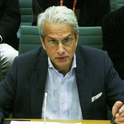Listen to Laurence “Lozza” Fox’s dog whistle: “You cannot hate them enough,” he posted on Elon Musk’s X, in reaction to a carefully neutral breaking Sky News story about a car ploughing into Liverpool fans. And then: “You cannot loathe or despise the state propaganda arm @bbc enough.”
I understood Lozza to be signalling to his 600,000 followers that an establishment cover-up was happening in front of their eyes. “They” were about to lie about the perpetrator. “What is coming next is inevitable,” he posted moments later. I think he was anticipating riots on the streets.
The man eventually charged with driving into the crowd is 53, white, and a former royal marine. Neighbours have been quoted calling him a “nice family man”. There have been no riots.
Park any thoughts of Lozza for the moment, and let us consider a major speech delivered at Oxford recently by Paul Marshall. It was titled “Reflections of a Reluctant Media Owner”—and it sought to explain why an ultra-wealthy hedge fund manager ended up creating GB News, along with UnHerd, a commentary platform, before acquiring the Spectator.
His views command attention, if only because of his prediction that by 2028, the UK will have only two dominant news channels: the BBC and his own GB News, in which he has a 40 per cent stake, which has lost more than £100m to date.
Marshall’s speech was a conventional-enough analysis of the British media landscape. He has noticed that most national newspapers tilt to the right. He shares the belief of those on the right that the BBC tilts to the left. It’s all a bit tribal for him.
He believes the Times, alone among newspapers, presents opinion pieces each day “from all sides of the political spectrum.” This may surprise some Times readers. His favourite word is “heterodox”; his least favourite adjective is “metropolitan.”
When it comes to the BBC he believes that BBC Verify, a fact-checking unit, “is frankly an abuse of taxpayer money and should be shut down.” In an ideal world the entire BBC—which he describes (just like Lozza!) as “the propaganda arm of the state”—should be sold off. Failing that, it should be broken up. For Marshall, the BBC began to lose its way when—under Blair!—it stopped playing the national anthem on a daily basis: “This is the point at which patriotism was quietly erased from its mission.”
There are frustrating lacunae in the speech. Marshall does not, for instance, reflect on whether an ultra-wealthy hedge fund manager is well-placed to make fine judgements about impartiality or bias. If it is not to be hedge-fund managers, then who?
But the most striking thing missing from Marshall’s lecture is the gap between his analysis of what’s wrong with the media and his answer: the creation of GB News.
Here is a man who hates tribalism; says he likes his own biases to be challenged; and admires the “open-minded centrist ground” represented by the Times. And who then thinks the answer is to create a monocultural TV channel representing every political view on a spectrum from Jacob Rees-Mogg to Lee Anderson via Nigel Farage and the Reclaim party’s “leader”, Laurence Fox?
If you think the BBC is a bit lefty and iffy with the facts then why would you reach out for a cast which included the whacky cleric, Rev Calvin Robinson, Dan Wootton, Darren Grimes, former Reclaim candidates Leo Kearse and Martin Daubney, Brexit’s Michelle Dewbury and climate change rubbisher Neil Oliver? What is the societal problem you’re trying to fix with your investment in British television of tens of millions of pounds?
Marshall is pleased with the ratings, which—as a rolling news channel with an energetic social media wing—sometimes nudge the BBC. I wonder if he’s ever looked at surveys of trust, which regularly show the hated BBC outperforming all others—and trouncing GB News?
YouGov in 2023 scored the BBC at net plus 23 compared with GB News on minus 15. Another YouGov poll the following year found 41 per cent trusting the BBC “a great deal or a fair amount” against 24 per cent for GB News. The Reuters Institute Digital News Report finds that the BBC, at 62 per cent, is easily the most trusted news brand in the UK. GB News scores 29 per cent.
Are all these people who trust the BBC’s approach to journalism deluded? Is Marshall the only one who can see clearly? If he truly wished for better-informed citizens did he consider other uses for his riches? Has he, for instance, noticed the local newspaper industry gasping for breath as towns and neighbourhoods across the UK threaten to turn into news deserts? Did he really think hiring Laurence Fox (later sacked for misogyny) was the best response to the age of information chaos?
As it happens, I get a name check in Marshall’s speech. I am, apparently, one of the “biggest advocates of censorship and control narrative”—up there with Hillary Clinton, Plato and the EU’s Ursula von der Leyen. I take it this is because I’m a member of Meta’s Oversight Board, which aims to protect free expression online while balancing it with possible harms.
In most of our decisions, we actually vote to restore content to Meta’s platforms that, in our view, has been mistakenly removed, but no matter.
There are people who call themselves free speech absolutists, for whom any restraints amount to censorship. Elon Musk sails under that flag, as does Lozza. Marshall doesn’t quite pinpoint where he himself sits. At one point he muses on the dangers of truth being sacrificed in favour of conspiracy theories and tribalism. And yet it feels that the point of GB News is precisely its tribal nature.
One of the recent decisions by the Oversight Board related to the aftermath of the Southport killings when social media was widely used to spread disinformation about the ethnicity, religion and asylum status of the killer. More than that, it was used to whip up mob violence and hatred against Muslims. Real violence, real hatred.
One of the posts which Meta left up called for mosques to be smashed and buildings where “migrants”, “terrorists” and “scum” live to be set on fire. Lucy Connolly, the wife of a Northampton councillor, was controversially jailed for 31 months for posting something similar.
Is it actually “censorship” to want Meta to remove such posts? Is that an example of biased metropolitan elitism? The “we-know-best” brigade? Or is it a responsible instinct for there to be limits on extremists who, in crowded theatres, shout “Fire!”
And Sky News and the BBC, with their restrained let’s-stick-to-the-facts approach. Is that really (per Lozza) loathsome and despicable? Do you (per Marshall and Lozza) really think the BBC is the “propaganda arm of the state” and should be sold off; or that BBC Verify is an “abuse” and should be closed down? Who should make judgments about impartiality—ultra-wealthy hedgies, or Ofcom? Who is in touch with the “common sense centre ground” here, and who isn’t?
I do not wish to be mean about Marshall. I’m glad he founded UnHerd. The Spectator remains a great magazine. He is a generous philanthropist. But, by his own account, he is on course to be a mini-Murdoch in the not-too-distant future. His views matter. But some of those views range from unformed to unsettling. Keep an eye on him.













